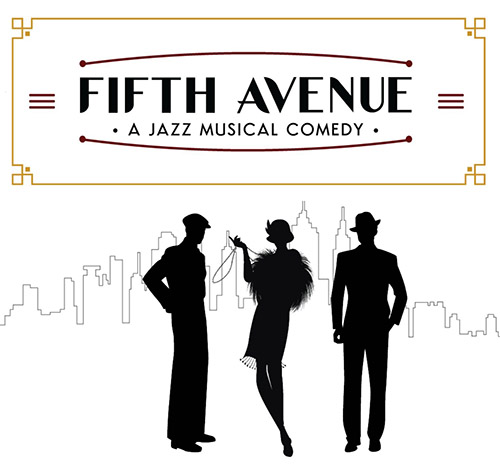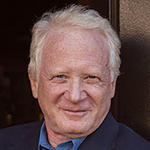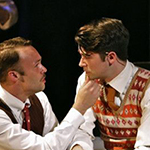Fifth Avenue: A Jazz Musical Comedy
Don’t Tell Mama, NYC, January 22, 2024
Reviewed by Bart Greenberg

The classic cabaret room at Don’t Tell Mama has been playing host to a series of Monday-night performances of a new musical, Fifth Avenue: A Jazz Musical Comedy. These presentations are not concert versions; they are fully staged productions (within the confines of the limited stage space) and performed without scripts. There were also costumes and some rudimentary choreography (by Andrea Andresakis), who also directed. The authorship of the evening was divided between Daniel Seidman (music and lyrics) and Susan Crawford (book and lyrics). A cast of seven theater professionals (a mix of veterans and new faces) did all they could with the thin but over-complicated script, and they will most likely shine more in a different setting.
The story is a mix of every Warner Brothers gangster film made in the 1930s, Damon Runyon stories, and a bit of Newsies. An amiable hood named Maxwell (Christopher Sutton filling in for Edward G. Robinson with Jimmy Cagney’s tap shoes) and his right-hand man Willy (Joseph Peterson inhabiting Frank McHugh with a bit of Art Carney’s Ed Norton) have failed at every illegal venture available to nonviolent miscreants in the 1920s. Now they are signing a lease with the agent for Mr. Big (or is he) Tommy Grace (Beau Allen playing Humphrey Bogart in his early non-star parts but resembling Lee Marvin) to open a nightclub that will not serve alcohol (a highly unlikely idea in prohibition-era New York). Max’s daughter, Rachel (probably one of the Lane sisters), returns home from Europe where she has been living the high life and is under the impression that her daddy is a successful and respectable businessman; Adriana Vicinanzo was saddled with this unpleasant role of a haughty, snobbish, and not-very-bright ingênue. Rachel is immediately reunited with childhood friend Neal (James Lynch, filling in for Jeffrey Lynn), the city’s oldest newsboy, who, of course, carries a torch for her. She also meets the charming social climber Donald (Kevin Arnold in for George Brent) who has rather obvious “secrets” of his own. For reasons known only to herself, she lies about her name and her profession, passing herself off as a saloon singer. Of course, there is a real diva (and conveniently Maxwell’s ex) Davania (without doubt, Glady George) who changes partners as easily as the breeze changes directions. Everyone has conflicting goals and no one seems to care much about anyone else. This doesn’t make for very good drama.
Of course, this being a musical, a tasty period score might have lifted up some of the undramatic doldrums. Unfortunately, the score is even more pedestrian than the book. There are indeed some highlights, such as the romantic “Out of the Fog” and a sweetly melancholy folk song, “Shana Madela” (by Murray Seidman). There were also some attempts at pastiche numbers for the nightclub scenes that lacked the specificity that captures a distinct period. As for the rest of the score, much of it is in a minor key which doesn’t fuel the musical comedy feel of the piece; it also tends toward the conversational with little build and very flat endings. Music director/pianist Clare Cooper offered bland accompaniment that soon blended all the numbers together. Then, surprisingly, as the show got to its final sequence, it suddenly came alive with a charming script of rhymed couplets (very Larry Hart) and a light touch sadly missing elsewhere. It suggests that the authors might be capable of solving some of the problems of the evening. Hopefully, they’ll do the work this show needs.





